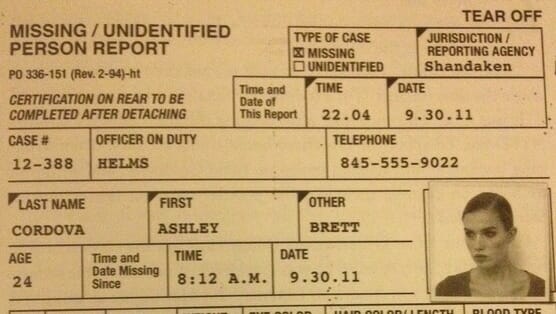Night Film by Marisha Pessl

Writing a literary thriller continues to be a good way to disenfranchise all possible audiences. Too literary, and the folks in the airport mystery section with their hands full of John Grisham and James Patterson spurn you. Easy, appealing plot and no pretty rhetoric? The world’s MFA population sneers. If a writer finds a balance between the two, however, engaging both audiences with a gripping, stylistic caper, then we get a magical and ageless novel.
Marisha Pessl didn’t quite write that book.
The literary world first found Pessl after the 2006 publication of Special Topics in Calamity Physics. A first novel much beloved by many, it earned her comparisons to Donna Tartt and J.D. Salinger. The New York Times picked it as one of their best books of the year, and it earned her a well warranted critical weight. But after all that, perhaps it’s unfair to assume her sophomore novel would find the aforementioned balance.
Just released in paperback, Night Film carries on for an engrossing few hundred pages. Scott McGrath, a recently disgraced journalist, investigates the suicide of a mysterious, award-winning director’s daughter, Ashley. During the investigation, he gains the trust and help of a homeless teenage girl and a stoic man from Ashley’s past, forming an unexpected trio to solve the puzzle of Ashley’s life and family. But while the others desire answers, McGrath wants to prove his obsession with her father, Stanislas Cordova, is warranted:
I could feel it starting again—the dark undertow towards Cordova. Forget my fury toward him, which still simmered—this was a chance for absolution. If I went after him again and proved he was a predator¬—what I’d believed in my gut—all I’d lost might come back. Maybe not Cynthia, I couldn’t hope for that, but my career, my reputation, my life. And unlike five years ago, now I had a lead: Ashley.
The novel uses a multimedia approach, including clues and evidence a reader peruses along the way. A New York Times obituary begins the story. A Time photo gallery provides context. Transcripts, police reports and surveys of the deep web create a believable world that begins to blur lines between the reader’s reality and McGrath’s.
The blurred lines become the point. As McGrath investigates, his reality also begins to merge with that of this director’s horrific, nightmarish movies—his “night films.” For McGrath, this becomes more a tale of obsession than anything else. Still, he has to solve the case even though he knows it could ruin him. And that’s what draws you in, because you either follow the investigator to his destruction or the liberating solution, both appealing prospects.
As McGrath describes it, the story becomes his “lintworm,” a news story that a journalist goes after. But that turns out to be “… A tapeworm that’s eaten its own tail. No use going after it. Because there’s no end. All it will do is wrap around your heart and squeeze all the blood out.”
Stanislas Cordova, the antagonist of the novel and McGrath’s obsession, exists in this tale like a ghost that moves furniture. He hinders the investigation and becomes the prime suspect when evidence of black magic and the occult appear. Cordova, an enigmatic and controversial figure, may not even be real. His presence haunts the novel, and, as in any good ghost story, the reader can be captivated by this phantom.
The multimedia aspect of the books never feels superfluous or lame. It provides incredible momentum. The pictures and copies of newspaper articles create welcome breaks between intense scenes, and these allow a reader to release the breath. The only problem? The publisher goes one click too far by creating an app to accompany the book.
I discovered the app halfway through the novel and quickly dismissed it as a gimmicky marketing ploy. I downloaded and attempted to use it on behalf of this review, but ultimately couldn’t get it to work. Frustrated, I deleted it. I found it just another interruption, a good reason for me to stop reading and pick up my phone.
-

-

-

-

-

-

-

-

-

-

-

-

-

-

-

-

-

-

-

-

-

-

-

-

-

-

-

-

-

-

-

-

-

-

-

-

-

-

-

-








































